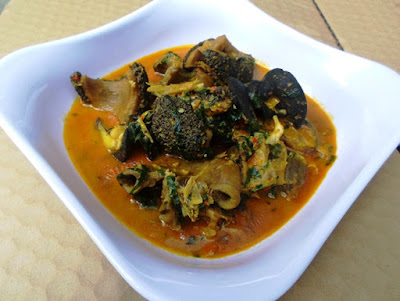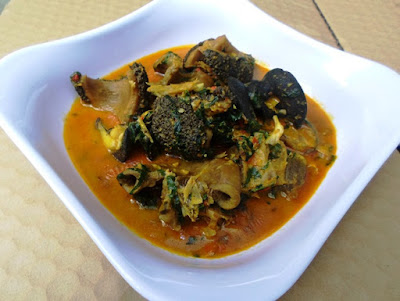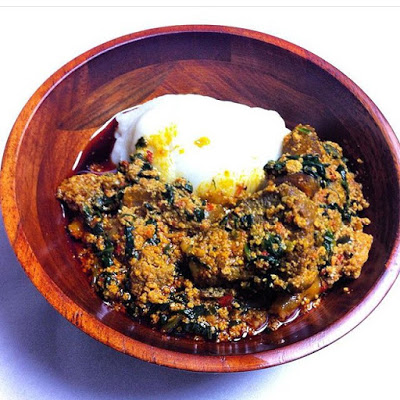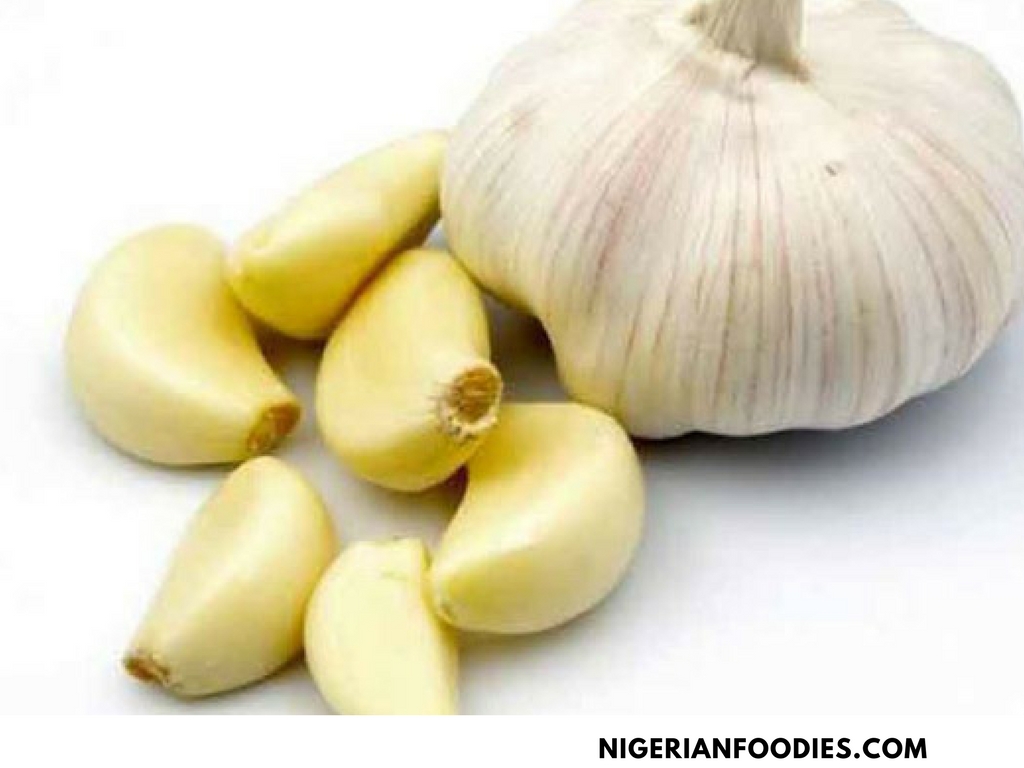Ofe Owerri is a popular traditional Nigerian soup that originates from the Igbo ethnic group, specifically from the Owerri region in Imo State, Nigeria. It is a delicious and nutritious dish made with a variety of ingredients, including assorted meats, fish, and vegetables, all cooked in a flavorful broth.
The soup typically includes a combination of leafy vegetables such as Ugu (fluted pumpkin leaves) and Oha (ora) leaves. These leaves are what give the soup its distinctive taste and aroma. Other ingredients can vary depending on personal preferences and availability, but some common additions include:
- Assorted meats: This may include beef, goat meat, chicken, tripe, and/or cow skin (ponmo).
- Fish: Different types of fish, including dried fish or smoked fish, are often added to enhance the flavor.
- Palm oil: This is the base oil used for cooking the soup and gives it its rich, reddish-orange color.
- Stockfish and/or dried crayfish: These dried seafood products add depth to the flavor.
- Periwinkle: A small sea snail often added for additional taste and texture.
- Seasonings and spices: Typical seasonings include salt, pepper, ogiri (a traditional seasoning made from fermented oilseeds), and other local spices for extra flavor.
The preparation of Ofe Owerri involves various steps, including boiling the assorted meats and fish until tender, then adding palm oil, crayfish, and other seasonings to the pot. The Ugu and Oha leaves are usually added last, as they cook relatively quickly. The soup is best served with fufu or a starchy side dish like pounded yam, fufu, or garri.
Ofe Owerri is a cherished delicacy among the Igbo people, and it is also enjoyed by many Nigerians and food enthusiasts worldwide. Its rich taste and variety of ingredients make it a delicious representation of the diverse and flavorful Nigerian cuisine.
How to Make Ofe Owerri
Here’s a recipe to make Ofe Owerri:
Ingredients:
- Assorted meats (e.g., beef, goat meat, chicken, tripe, etc.)
- Assorted fish (e.g., dry fish, stockfish, or smoked fish)
- Assorted vegetables (e.g., Ugu leaves, spinach, water leaves, etc.)
- Palm oil
- Crayfish (ground)
- Ogiri Igbo or Okpei (traditional Igbo seasoning)
- Pepper (fresh or ground)
- Stock cubes or seasoning powder
- Salt
- Onion
- Ground ukpaka or utazi leaves (optional)
- Cocoyam or Achi (thickener)
Instructions:
- Prepare the assorted meats and fish by cleaning them thoroughly. Cut the meats into bite-sized pieces and soak the dry fish or stockfish in hot water to soften it. Remove any bones and break into smaller pieces if necessary.
- Wash and cut the vegetables. Traditionally, Ugu leaves and water leaves are used, but you can use spinach or other similar greens if you can’t find them.
- If using cocoyam as a thickener, peel and boil the cocoyam until soft. Then pound or blend it into a smooth paste. If you’re using achi, mix it with a small amount of water to form a smooth paste.
- In a large pot, add the assorted meats, fish, chopped onions, ground crayfish, and pepper. Season with stock cubes or seasoning powder and a bit of salt. Pour enough water to cover the contents of the pot and cook until the meats are tender.
- Once the meats are cooked, add palm oil and allow it to cook for a few minutes, stirring occasionally.
- Add the ground ukpaka or utazi leaves if you have them for added flavor.
- Now, add the thickener you prepared (cocoyam paste or achi) into the pot and stir well to avoid lumps. Let it simmer for a few minutes until the soup thickens to your desired consistency.
- Finally, add the chopped vegetables (Ugu leaves or spinach) and Ogiri Igbo (or Okpei) seasoning. Stir gently and let the soup simmer for a few more minutes until the vegetables are cooked but still vibrant in color.
- Adjust the seasoning with salt and pepper according to your taste.
Your Ofe Owerri is ready! Serve it with your choice of swallow (e.g., fufu, pounded yam, or garri) or rice.










